NATIONAL NETWORK OF “TRADITIONAL LUDIC COMMUNITIES”
Communities of the Italian Tocatì network, coordinated by AGA, have been actively participating and involved in the multinational nomination process and the preparation of the dossier, since 2016. In Italy, declarations of consent have been collected from communities and letters of support from NGOs and institutions since 2017. The consent declarations were written by Communities, Groups and Individuals (CGIs) of the Tocatì network, protagonists with AGA in the safeguarding process and committed to the dissemination of good safeguarding practices. The communities are supported in their efforts by NGOs, universities, local, regional and national institutions, which have sent letters of support for the application:
Italian NGOs
UNPLI – Unione Nazione Pro Loco d’Italia; MIMAP – Associazione per la conservazione delle tradizioni popolari-Palermo; Associazione Sant’Antuono & Le Battuglie di Pastellesse, Macerata Campania CE; SIMBDEA – Società Italiana per la Museografia e i Beni DEA, c/o Museo internazionale delle marionette Antonio Pasqualino, Palermo; Associazione Italiana Beni Patrimonio Mondiale; Associazione Giovani UNESCO;
Italian Universities Network:
Cultural Anthropology Chair University of Chieti-Pescara;
UNESCO Chair ‘Mediterranean Cultural Landscapes and Knowledge Communities’ University of Basilicata;
University of Verona
Local and regional administrations:
Municipality of Verona
Municipality of Rialto
Municipality of Ollolai
Municipality of Borgo Valbelluna
Municipality of Novara di Sicilia
Municipality of Mede
Municipality of Pienza
Municipality of Urbino
Veneto Region
Regional Education Office (USR) of the Veneto Region
Lombardy Region
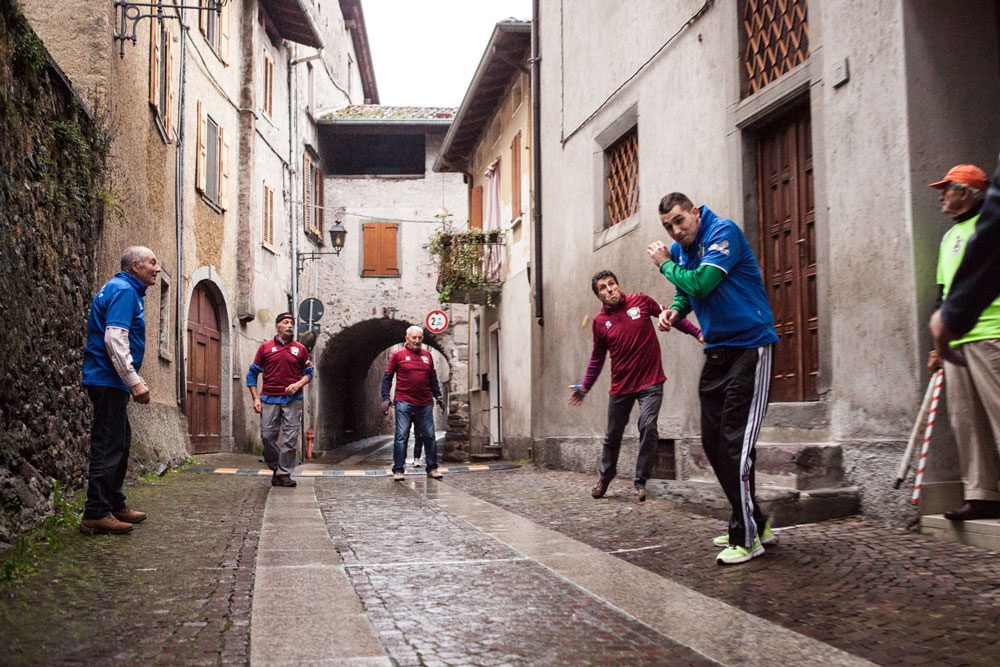
The Friends of Bala Créela formally established their association in 2019 and immediately set to work with great enthusiasm to make their game known: they bought balls to play with, t-shirts for the team members and created a photo album of the players. A twinning with the Piedmontese Pantalera, met in Verona on the occasion of the XVII edition of Tocatì, gave further strength to the group that is committed to transmitting the spherical game of Bàla and its memory to the new generations. “For us, the Tocatì programme was like the spring of a music box. We hope that this candidacy will be successful and that Tocatì will be registered in the UNESCO Register of Good Practices, for the wellbeing of future generations.”
Associazione Amici della Bàla Creèla
Gianico, Val Camonica, Brescia, Lombardy.
Go to the website
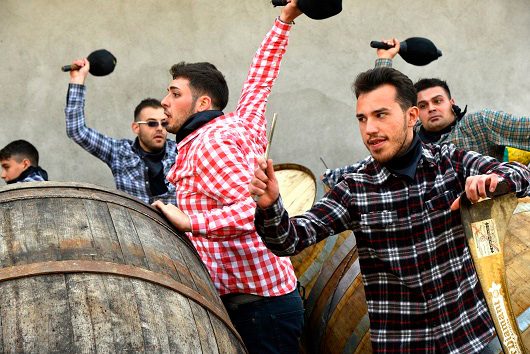
The Battuglie di Pastellessa have been participating in the Tocatì festival for many years with the game of Palo di sapone and with the musical performances of the Bottari di Macerata Campania. The most famous festival where we can meet them is the annual ‘A Festa ‘E Santantuono: a moment of leisure and aggregation for the whole community, which invariably participates in large numbers at the event. On this occasion, the game and traditional music have always been recognized as expressions of the cultural heritage of the territory.
“Since its establishment, UNESCO has contributed to preserving peace through awareness and respect for the culture of others. The Tocatì program, fully reflecting the principles and objectives of the 2003 UNESCO Convention, represents for us a good practice of safeguarding to be applied as a model in the communities.”
Associazione Sant’Antuono & le Battuglie di Pastellessa
Macerata Campania, Caserta, Campania.
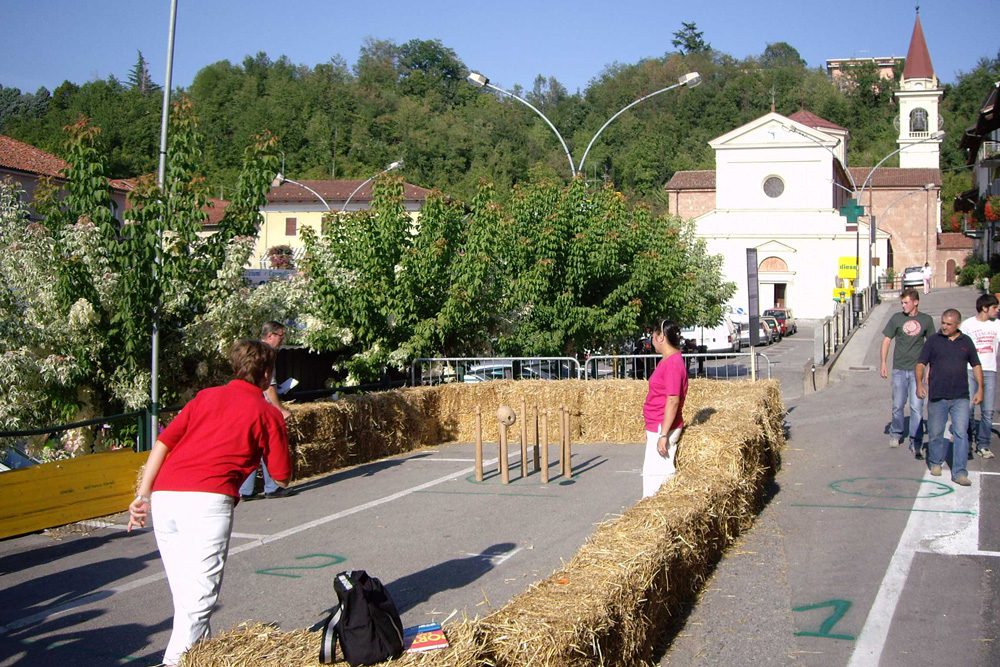
The Bijè ludic community is made up of a group of players of all ages who are committed to transmitting this skittles game as a tool for peaceful coexistence and comparison between cultures. Aware of the cultural and historical role of their game, the skittles women of Farigliano are committed all year round to making Bijè known, both during the main event of the town, La Festa del Bun Vin, and within the Tocatì Festival. A game that physically requires dexterity, aim and ability but which at the same time is recognized for its great importance at a social level.
“The game of Bijè is a women’s game. The merit of the women of the Bijè game community is not only that of having preserved the game of skittles over the millennia, maintaining figures, forms and gestures of ancient rites, but of having brought it into everyday life as an example of rebellion and affirmation against male power.”
Associazione Birilli di Farigliano – Gioco delle Bijé
Farigliano, Cuneo, Piedmont.
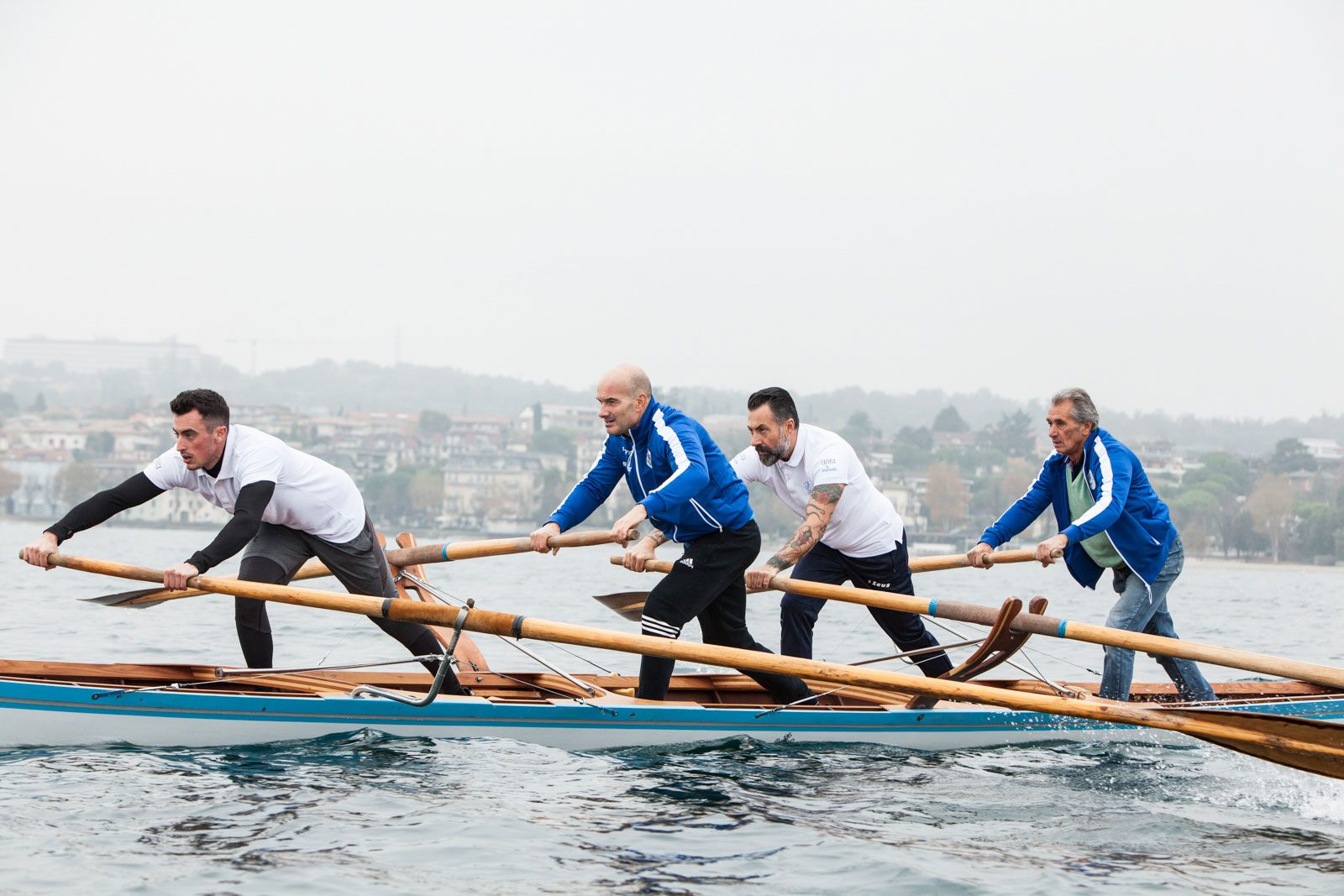
The Bardolino Nautical Centre together with Lega Bisse del Garda promotes the tradition of standing rowing on Bissa, a traditional boat from Lake Garda. Since 2018, Lega Bisse has actively participated in AGA initiatives and in 2019 it participated for the first time in Tocatì with an all-female delegation. Rowing in Bissa represents for this community a trait d’union with its fishing roots and a tangible manifestation of the intimate bond of the inhabitants with the territory and the lake.
“For us, UNESCO is the highest emblem of how the promotion and protection of cultural diversity, the valorisation of traditions and their dignity, reveal to us that humanity is one and unique, united by the desire for sharing and peace. The Tocatì program is an opportunity to share our experience and disseminate our tradition, with the aim of keeping our discipline alive but above all with the aim of transmitting the passion that drives us to the new generations: the rowers of tomorrow.”
Bardolino Nautical Centre, Lega Bisse del Garda
Bardolino, Verona, Veneto.
Go to the website
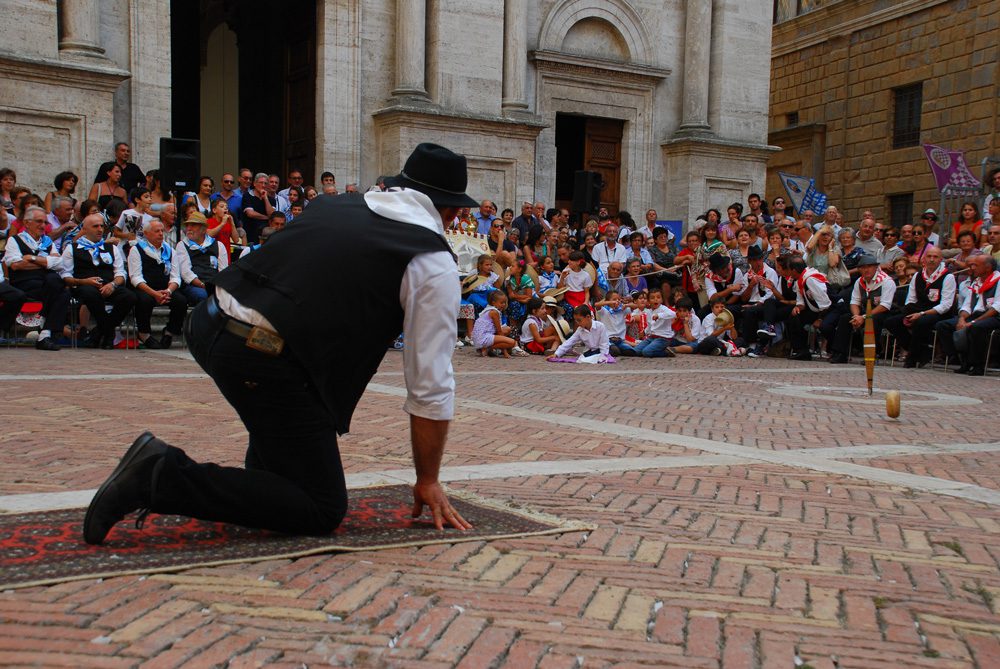
The Cacio al Fuso game in Pienza takes place every year during the Fiera del Cacio in Piazza Pio II, which has always been the beating heart of the city and the place where the community gathers to celebrate its rites. The game, played in ancient times in the farmyards and in the squares, consists of rolling a form of aged cheese towards the centre of a target indicated by a spindle stuck in the ground. The game tool, the cacio, represents the link with the local production and recalls the ancient custom of shepherds to test the maturation of cheese forms, which has transformed, over time, into a game.
“We hope that this nomination will be successful and that Tocatì will be registered in the UNESCO Register of Good Practices, for the benefit of future generations. Because for us, UNESCO means exactly this.”
Pro Loco Pienza
Pienza, Val d’Orcia, Siena.
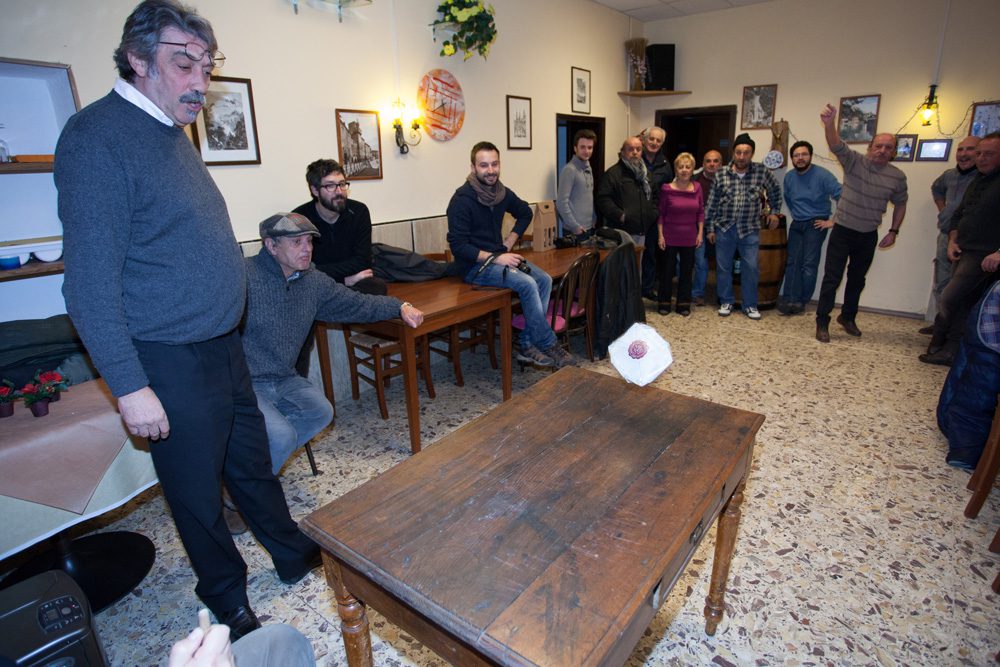
The game of Capanna owes its name to the way of indicating the best shot that a player can get by throwing a panforte shape on a table, pushing it as far as possible without dropping it. Panforte, the true protagonist of the game, is a Tuscan dessert with very ancient origins, which needs to be beaten before being eaten: hence the origin of Capanna, which every year during the Christmas period involves more than 120 players, both male and female, who challenge each other in the taverns of the town.
“The Tocatì program is a unique experience for us. Seeing so many players play ancient and different games is truly exciting. Participating in the Tocatì Festival also represents a moment of diffusion of our game and the rediscovery of old traditions that risk being lost in the new generations.”
Capanna Game Group
Santa Fiora, Grosseto, Siena.
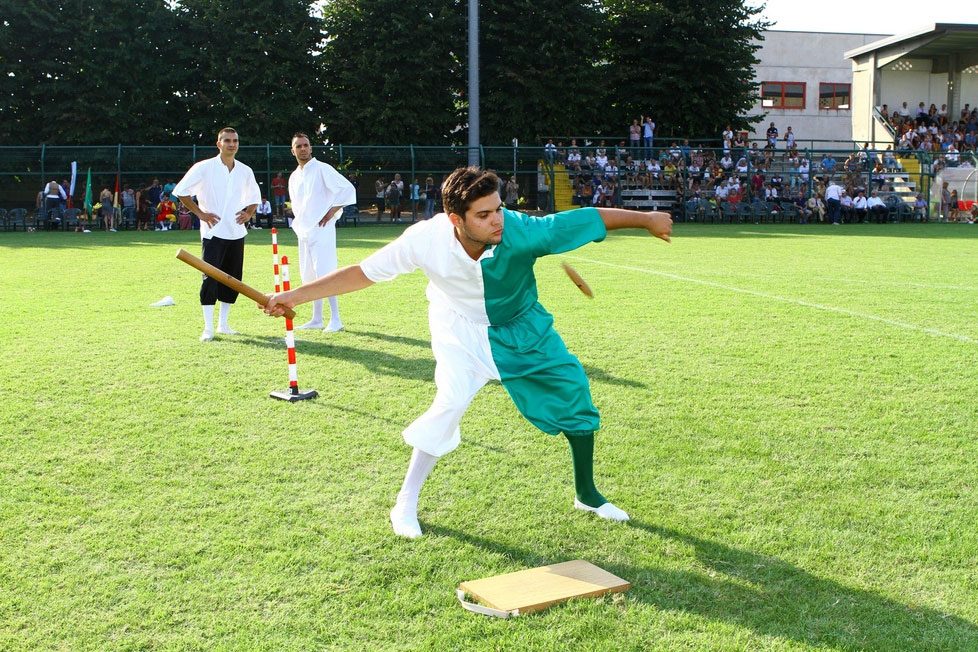
The Fiö and Fiulät d’lä lippä have been participating in the Tocatì with the game of Ciaraméla since its first edition and for many years they have taken part in the initiatives of the Tocatì program at a national and international level. The game of Ciäraméla is a stick game passed down from generation to generation that consists of throwing a smaller piece of wood as far as possible, hitting it with a stick. There are many variations of this game worldwide and this makes Ciäraméla, and more generally Lippa, a tool for dialogue between cultures.
“Participation in the Festival and the Tocatì program has allowed us to establish relationships of friendship, cultural and playful exchange with other communities, but above all it has made us mature enough to evolve a reality that is now consolidated, which passes on the spirit of the game of lippa from generation to generation”.
Fiö e Fiulät d’lä lippä Association
Mede, Pavia, Lombardy.
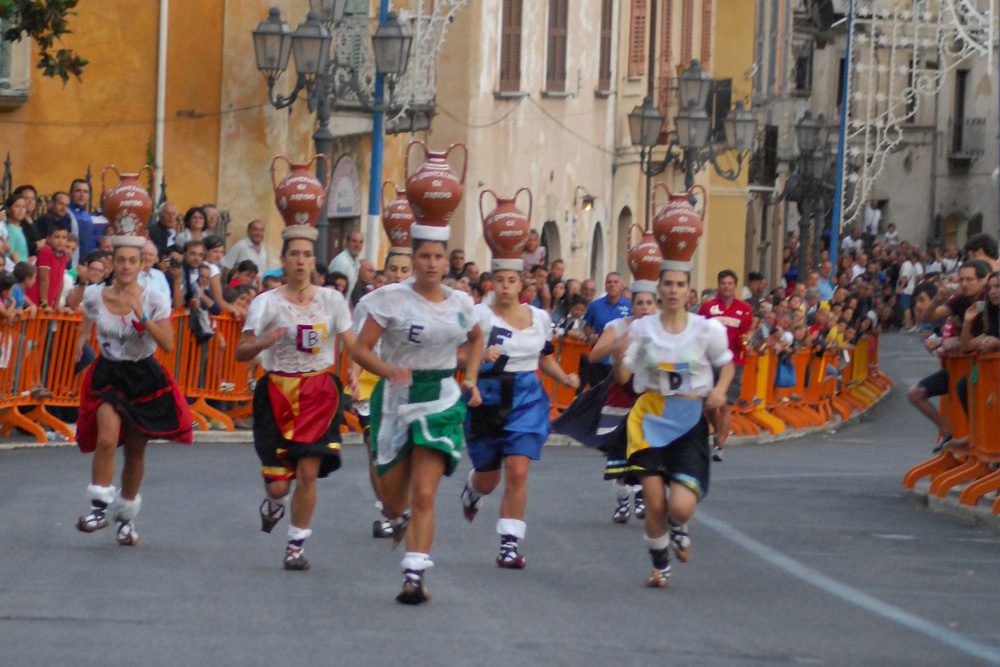
The Cannata Race is a race reserved exclusively for young women that takes place every year on the occasion of the Gonfalone di Arpino. The players challenge each other in speed while holding the Cannata on their heads, a terracotta container filled with water that can weigh up to 15 kg. This terracotta amphora is a symbol of the bond with the Ciociaria territory and is carried on the heads of 7 young competitors dressed in traditional costumes. This community has been participating in the Tocatì festival for many years and works with AGA all year round to safeguard the traditional game.
“Our game is a glue for our community, it divides us for a few days but unites us for the rest of the year, all in the name of protecting our ancient traditions.
Participating in the Tocatì program is for us a point of reference and a point of comparison of ideas with other communities, it makes us even more proud of the witness that we carry forward for the new generations.”
Associazione Pro Loco Arpino
Arpino, Frosinone, Lazio.
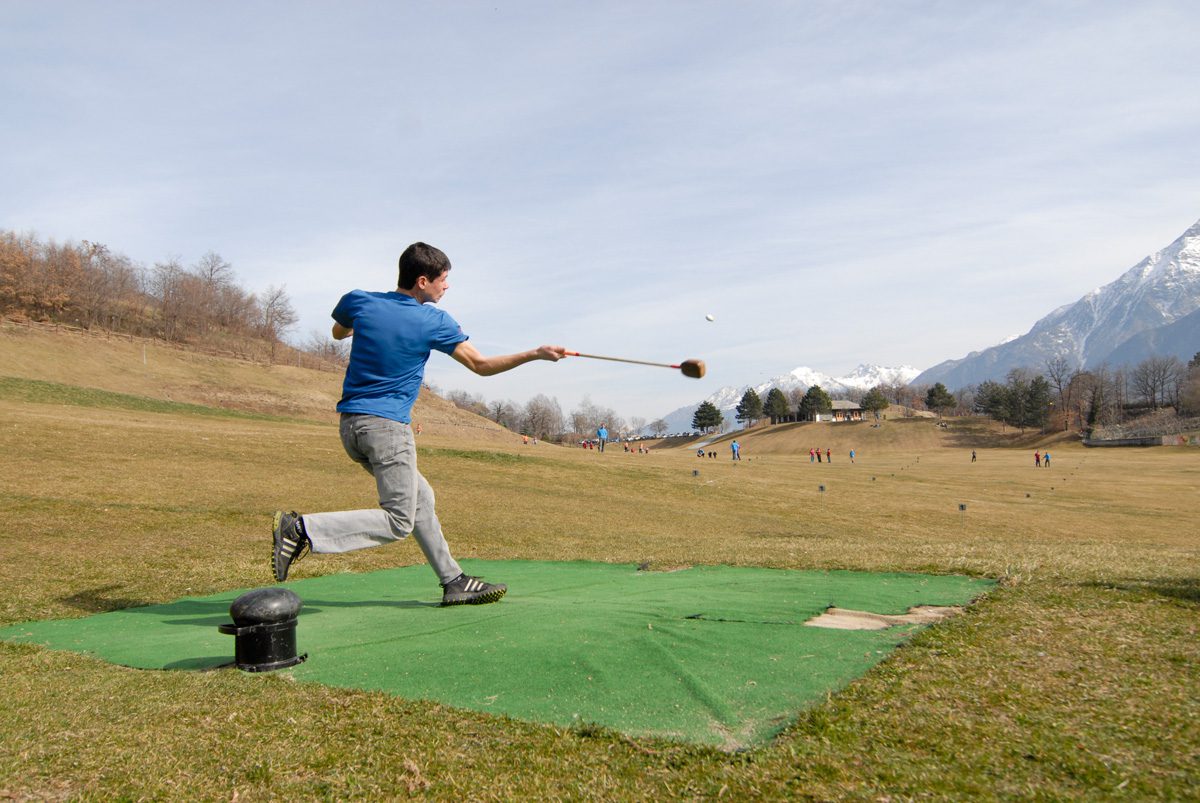
The FENT federation – Federachon Esport Nohtra Tera protects, promotes and researches the traditional games and sports of the Aosta Valley such as Fiolet, Palet, Rebatta, Tsan and Moura. For many years it has participated in the Tocatì festival, alternating the presence of these practices to make them known outside its own territory, where they are promoted and enhanced throughout the year.
“For our community, our games are a cultural phenomenon rooted in local tradition that has found fertile ground to assert itself despite the profound changes that have occurred in the social fabric and the multiple solicitations of a rapidly evolving world. The Tocatì program is a great opportunity for us to discuss and pursue cultural exchange projects with the common goal of promoting the value of traditional games and making them known to new generations.”
FENT – Federachon Esport Nohtra Tera
Valle d’Aosta
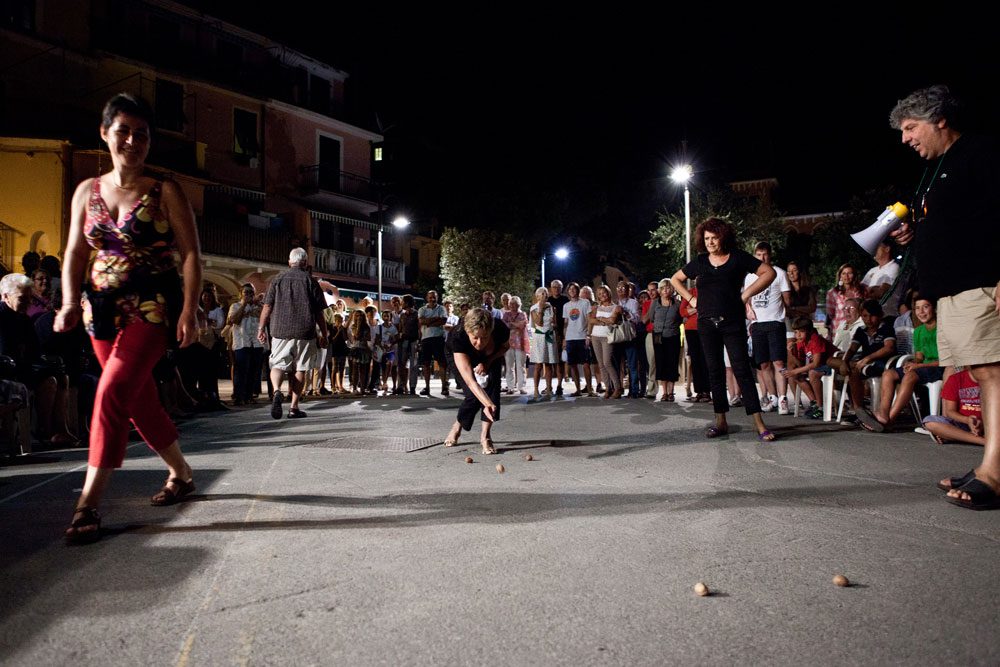
The Monterosso community of the Game of Walnuts has been working for many years to recover and promote the traditional games of the Cinque Terre town of Monterosso al Mare, with particular attention to the Game of Walnuts. The 5 Terre Tourist Consortium Association immediately joined with conviction the Verona Protocol of AGA, considering it a valid tool for the protection of the Traditional Game and Sport. For the community of the Game of Walnuts, the Associazione Giochi Antichi represents an institutional framework that can support and sustain the initiatives spontaneously promoted by the players of the town.
“The repeated participation of Monterosso in the Verona event of Tocatì has allowed contact with a wider level on a national and international scale, reinforcing the belief that what was carried forward represents something essential and indispensable.”
5 Terre Tourist Consortium Association
Monterosso al Mare, La Spezia, Liguria.
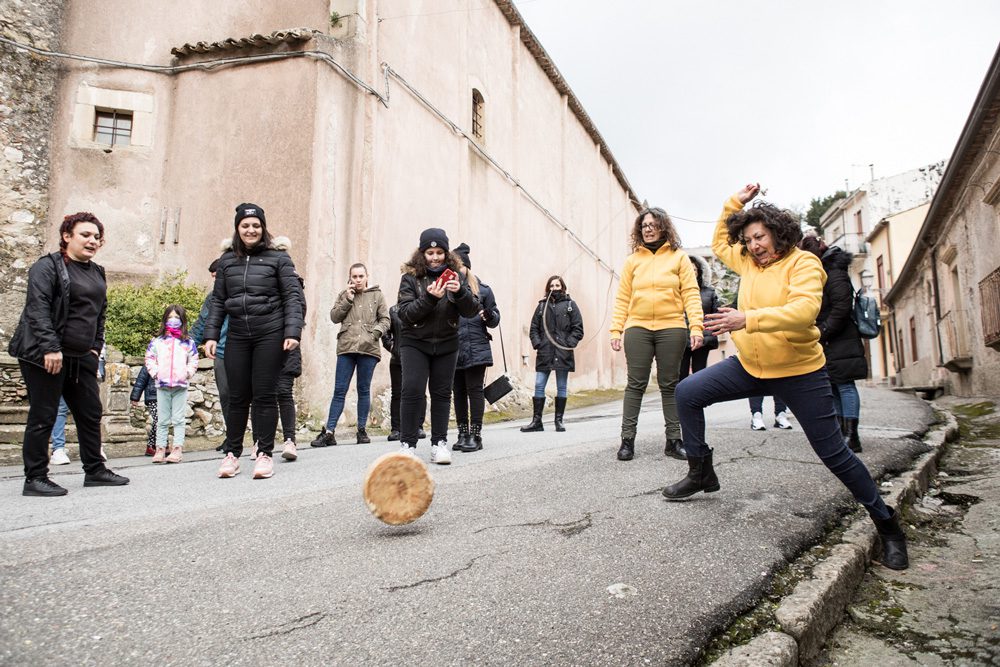
The Olimpia Sports Club has participated for many years in the Tocatì Festival and in the initiatives promoted by AGA during the year to promote the preservation of the traditional game of Lancio del Maiorchino. This game is played by men’s and women’s teams and consists of throwing a form of aged cheese along the streets of Novara di Sicilia, with the aim of being the first to reach the finish line, called sarvaù.
“For our community, the game is a moment of socialization and belonging to the territory: it is not the cult of the past but the sense of continuity and of the sacred importance of the permanent as well as the only immortality accessible to history.”
Associazione Circolo Olimpia
Novara di Sicilia, Messina, Sicily.
Go to the website
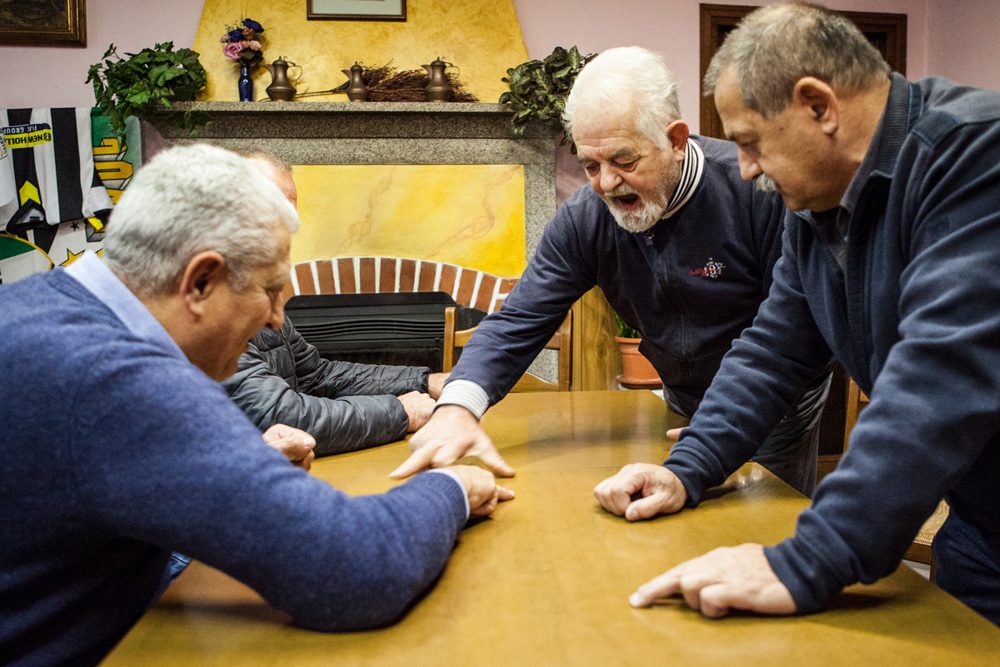
The community of Morra di Barbariga has been registered with CONI since 2005 and has 119 players. To raise awareness of the Morra game, which consists of guessing the sum of the numbers that are simultaneously shown with the fingers by the players, the ASD Compagnia della Morra participated in the Tocatì festival in 2019. The aim today is to return to the squares to raise awareness of this game again, banned from public places in the twenty years and still penalized by regulations. Morra is now practiced in festive contexts and introduced into schools, due to its great relevance to the teaching of algebra.
“The enthusiasm given to us by participating in Tocatì 2019 has given us the strength and the desire to continue to propose the Morra Game in our territory, to encourage young people to rediscover and practice this ancient game.”
ASD Compagnia della Morra
Barbariga, Brescia, Lombardy.
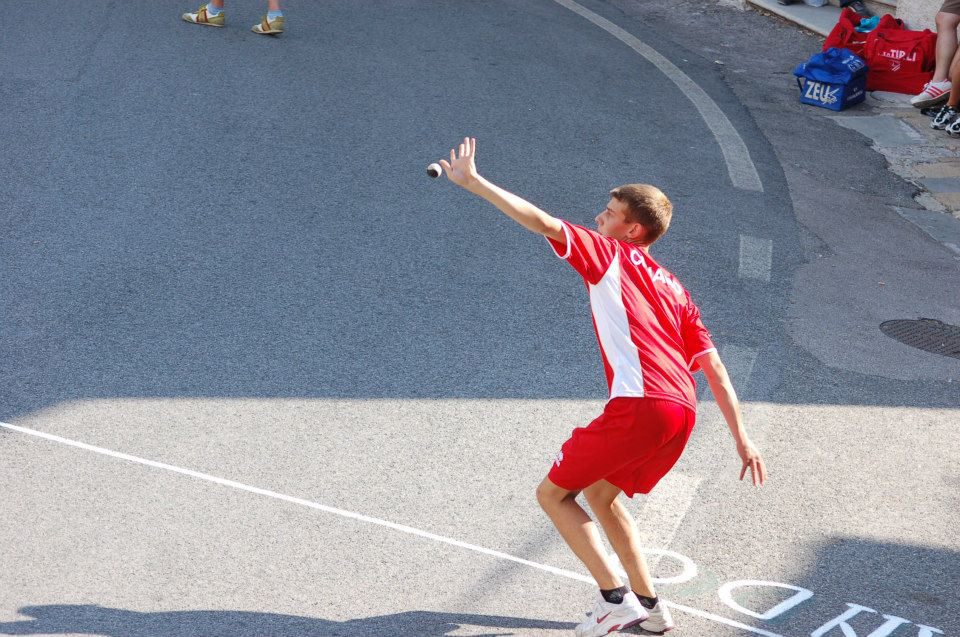
The Palla Eh! Association of Ciciano has participated in the activities of the national AGA network since the first meetings in 2002 and has taken part in the Tocatì festival in several editions. A popular game of Roman origins, the game of Palla Eh! Has always been played in the streets of the town: two teams of five players each challenge each other by throwing a hand-sewn ball with their hands. The cry “Eh!”, made by the mandator before throwing the ball, gives the game its name. The practice is concentrated between July and September and features players of all ages and cultures, coming from six municipalities in the province of Grosseto. Through this game, the Palla Eh! Association brings the game back to small villages, which risk being forgotten or suffocated by the presence of cars and prohibitions, encouraging the inclusion of new inhabitants and social cohesion.
“The Tocatì program is an opportunity for us to engage with other communities and create play networks, which are essential for strengthening the possibilities for protecting, safeguarding and promoting the game.”
Associazione Palla Eh!
Ciciano, Grosseto, Tuscany.
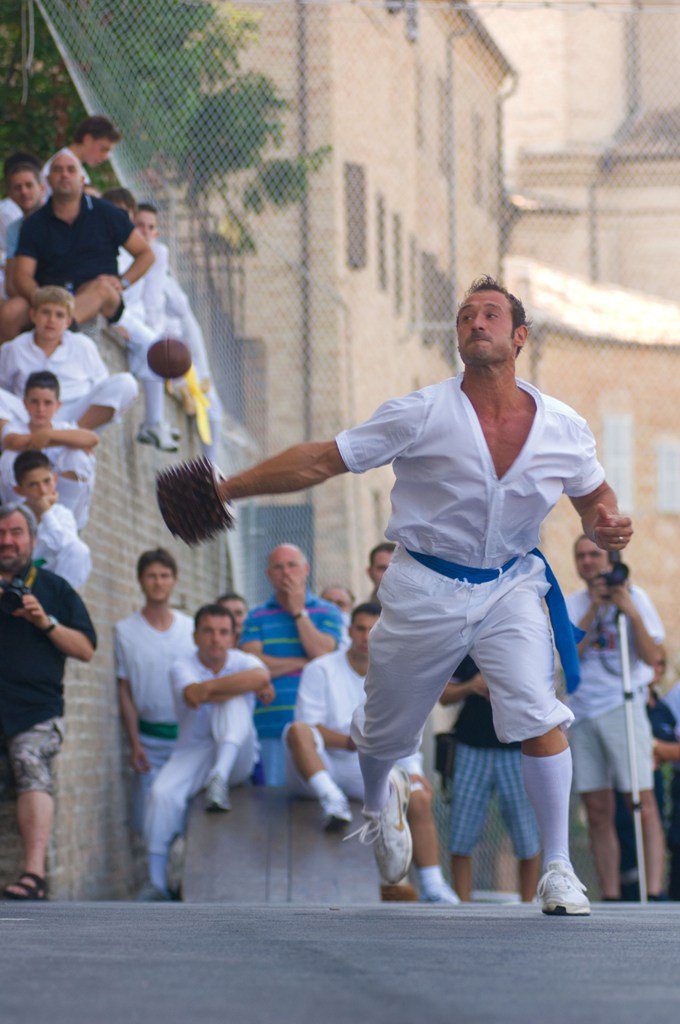
The Disfida del Bracciale Association is a cultural association committed to safeguarding the practice of the Gioco del Pallone Col Bracciale. The game consists of a team challenge between men and women who try to throw a ball back and forth, forcefully hit with a pointed wooden bracelet. The Association has supported the activities promoted by AGA since its inception in 2002, believing that the association’s work is valuable for promoting awareness of the game as an expression of a community’s cultural heritage.
“Being recognized by UNESCO for us would not only be the icing on the cake, but also the beginning of a new path based on greater protection and greater recognition, which would allow all traditional games to be further enhanced in their role not only as recreational, but above all as cultural, aggregative and social.”
Ente Disfida del Bracciale
Treia, Macerata, Marche.
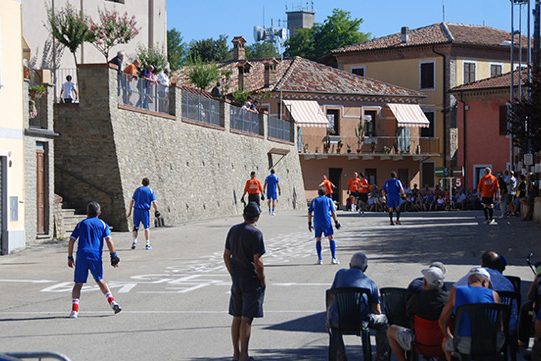
.Pantalera Elastic Ball is a game deeply rooted in the Piedmontese and Ligurian peasant tradition. An ancient variant of Pallapugno, Pantalera is a game widely played in the squares of the towns of Langa, Roero, Monferrato and the Ligurian hinterland. These territories challenge each other every year to the “game of balôn” in an Italian championship that involves over 30 towns in the area. The spontaneous and popular activity in the squares actively involves the locals, maintaining the spirit of parochialism, communion and socialization. A demonstration? The participation, in 2019, of the Brescian recreational community of Bala Créela, met on the occasion of the XVII edition of Tocatì, welcomed with great conviviality.
“A big thank you goes to the AGA that has taken action to promote events with a high social and cultural impact such as Tocatì. Our association has signed the Verona Protocol with conviction in 2018 and systematically participates in the initiative “Tocatì a shared heritage. The days of the intangible.””
ASD – APEP “Associazione Sportiva Dilettantistica Pallone Elastico alla Pantalera”
Langhe, Piedmont, Liguria.
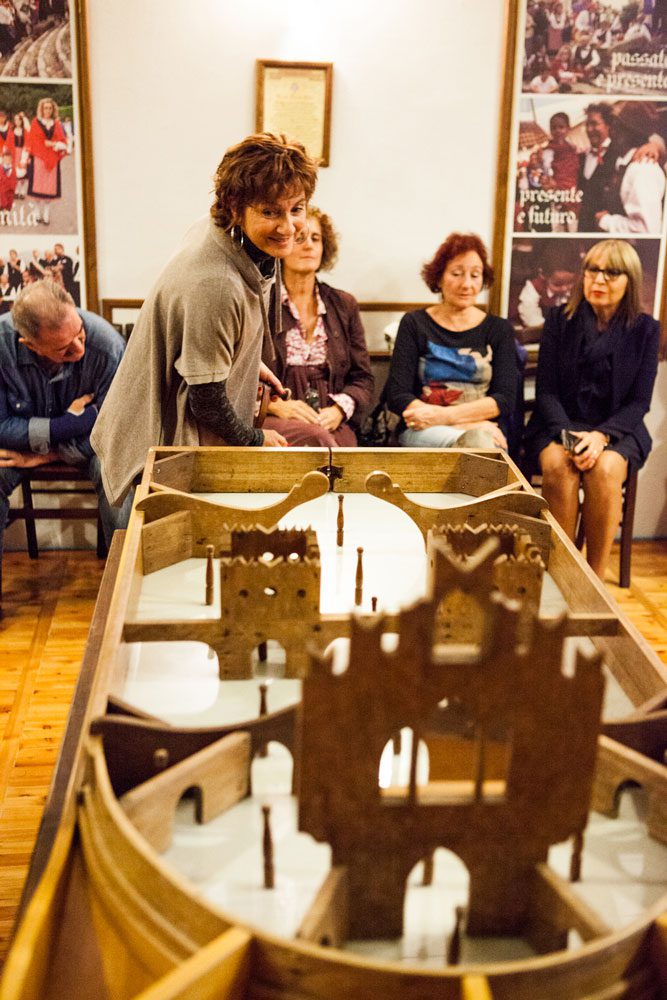
The Cooperativa l’Innesto is actively involved in the protection of the traditional game of Pirlì, an ancestor of pinball, and has collaborated continuously with the Associazione Giochi Antichi since 2002: it contributed to the drafting of the AGA Manifesto and the creation of a national network of Italian ludic communities. Among the communities that were protagonists of the first editions of Tocatì, the Cooperative has promoted at the same time, through the practice of the game of Pirlì, the feeling of belonging to the territory of Val Cavallina and the sharing of important universal values through play. Thanks to a European project, in collaboration with AGA, it has created a theme park called La valle in gioco.
“Every year, thousands of students of all levels visit the park and approach the games with enthusiasm, wonder and joy, taking with them the awareness that playing means collective fun that lives on the personal contribution of each person: the game allows participants to nurture self-help, the joy of meeting and comparing, peace.”
Cooperativa Sociale l’Innesto
Gaverina Terme, Bergamo, Lombardy.
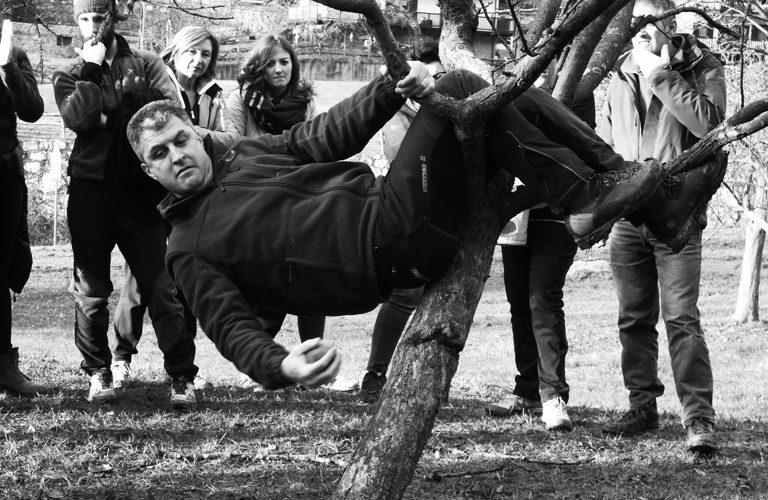
The game of Rouotta is a bowls game that takes place every year on December 26, outdoors, regardless of the weather conditions. Snow or rain do not prevent players of all ages from challenging each other in the street, on mule tracks or along municipal roads. The Pro Loco of Lillianes was in Tocatì in 2008, 2013 and 2019, where it introduced the practice of Rouotta thanks also to the participation of a large number of young people from the town.
“During the past editions in Verona we found a climate of communion that made us feel at home. We had the opportunity to create group memories that we will always carry with us, thanks to AGA who always knows how to impeccably welcome the hosted communities. We also participate in the initiative “Le Giornate dell’Immateriale”, a strong moment of exchange, mutual knowledge and awareness”.
Pro Loco Lillianes
Lillianes, Aosta, Valle d’Aosta.
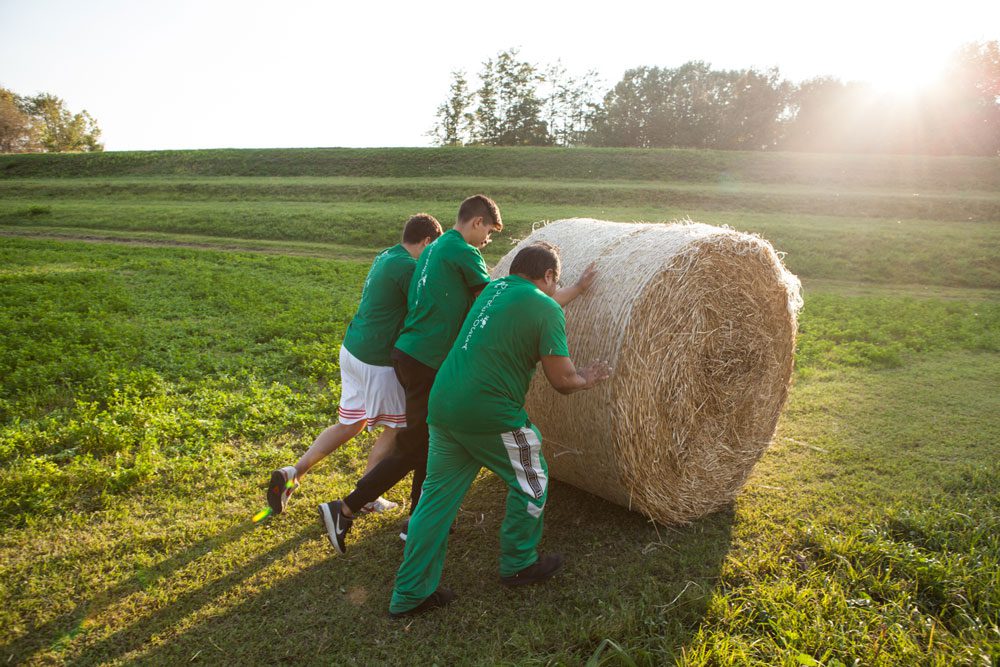
The Oltrefossa Association has been participating in the Tocatì festival for many years to promote the traditional game of Sbürla la Rôda, a practice that consists of pushing a round bale of straw along a pre-established path as fast as possible, in teams. The game tool strongly harks back to the origins of this recreational activity, which recalls the wheels of the floating mills that were once numerous along the Po, with its banks, woods, poplars and parish churches. Together with AGA, the Oltrefossa Association has been collaborating for years to build a local context that is attentive to the protection of Traditional Games and Sports as a tool to foster social relations and community life. The Sagra di Fossacaprara, the main event for the Sbürla community, is an important moment of identity linked to play, traditional cuisine and being together.
“The Tocatì program is a unique opportunity for us to break out of territorial isolation and build new relationships with other ludic communities that share the same needs and goals. Thanks to Tocatì, over the years we have built friendships with the Cacio al Fuso community of Pienza (SI), the Trampolisti of Schieti (PU), the Fiö della Lippa of Mede (PV) and since we met we have invited them to our festival with their games.”
Associazione Oltrefossa
Fossacaprara, Cremona, Lombardy.
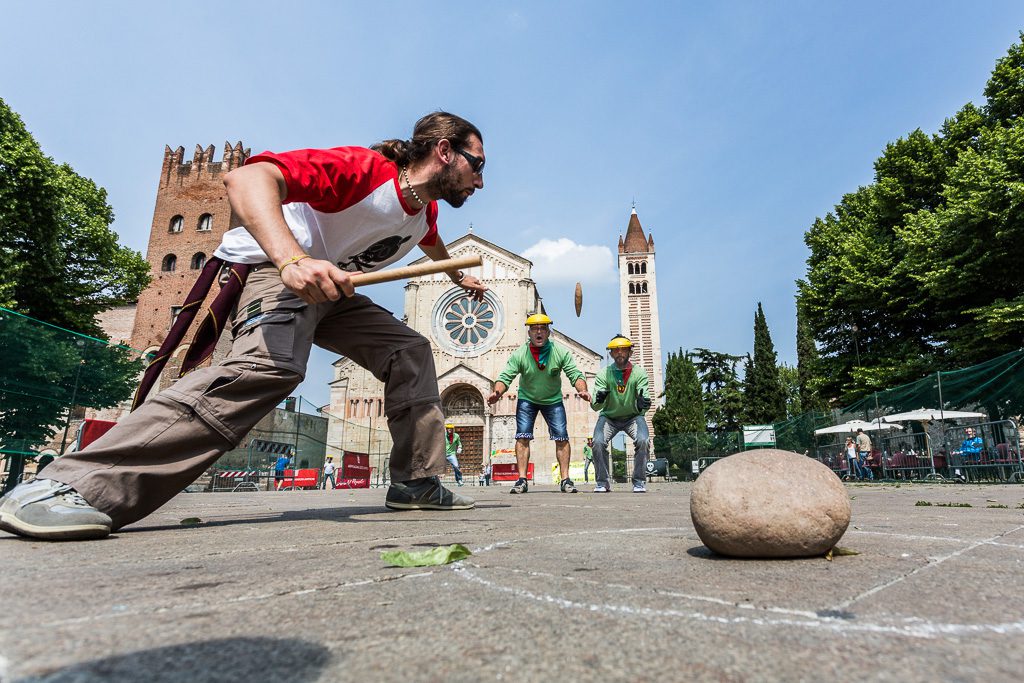
The S-ciànco, the shorter of the two tools used to play this stick game, is known in the Italian language as lippa. The game has very ancient origins and there are some testimonies of it at the Petrie Museum in London, which houses some finds dating back to the XI/XII dynasty that have been catalogued as lippe. The game is played widely in many territories of Europe, North Africa and Asia, such as Spain, France, Poland, Croatia, Slovenia, India, Sri Lanka and in Italy it is played in many regions, taking on different names from time to time: Rella in Milan, Nizza in Rome, Mazza and Pivezo in Naples, Ciärämèla in Pavia. Its diffusion allows this game to be a perfect tool for international dialogue and cooperation.
“Certainly the most important goal achieved by the association was to be able to give a shape to this community, which has seen the participation of teams of all types and compositions: from those coming from the mountains of Lessinia, to others composed exclusively of players or boys of Sri Lankan origin, who every year find themselves competing for victory, re-proposing in the urban centers of the province a territorial culture that would otherwise be difficult to transmit”
Associazione Giochi Antichi
Verona, Verona.
Go to the website
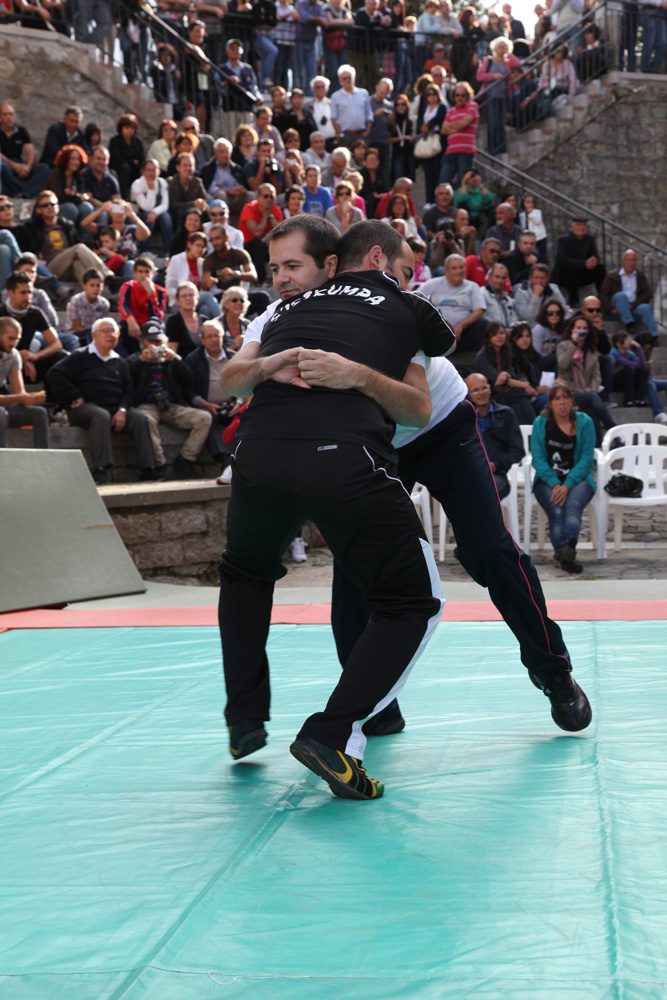
The ancient Sardinian wrestling of S’Istrumpa has very ancient roots dating back to the Nuragic period. S’Istrumpa was born with strong references to the pastoral and peasant tradition, it is practiced by shepherds during sheep shearing, wheat harvesting and at village festivals. In the 60s and 70s it was revived during military recruitment visits. Recognized as a strong identity and aggregative element, the S’Istrumpa fight is promoted and transmitted by passionate fighters in local initiatives, in schools and, assiduously, at the Tocatì festival.
“For many years we have enthusiastically participated in the Tocatì Festival and we believe that our presence is among the most assiduous and gratifying, it is a moment of meeting with the many gaming communities present, it is a moment of aggregation. The Tocatì Festival is a very important occasion for us, it is a showcase that opens up to the world of traditional games. Above all, we believe the work that Tocatì does as a ‘community of communities’ is very important.”
Federazione S’Istrumpa
Ollolai, Nuoro, Sardinia.
Go to the website
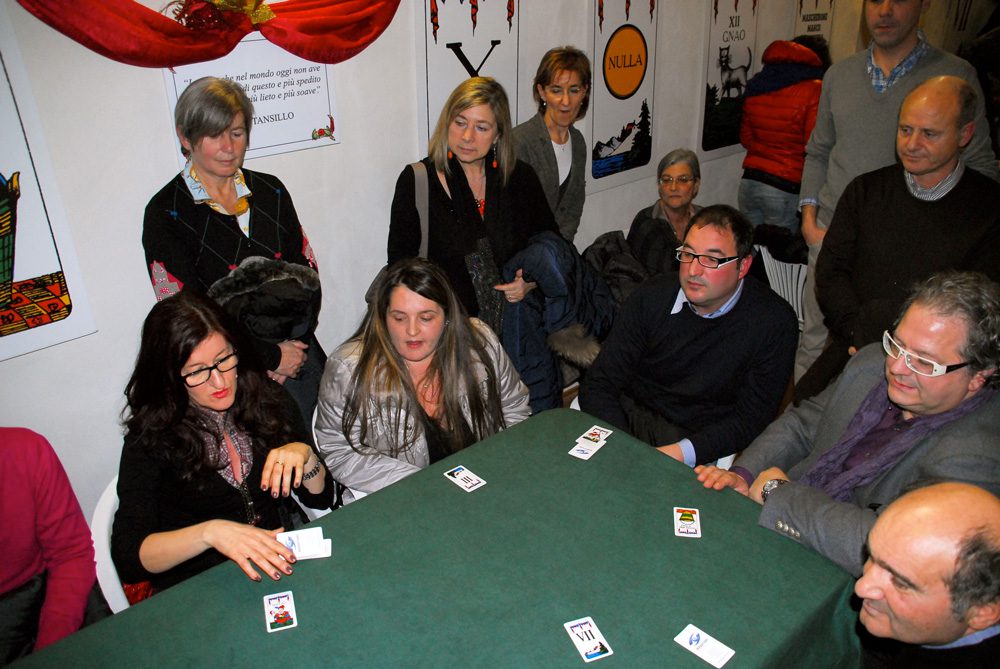
The Stù Game is a card game of chance played during the Christmas period in Montorio al Vomano, Abruzzo. The game, simple and intuitive, is played by players of all ages in public spaces such as bars and taverns. Playing Stù promotes a sense of community, aggregation and togetherness. Thanks to a few simple rules, the time of the game is inclusive, characterized by lightheartedness and lightheartedness.
“Becoming part of the Tocatì “family” was a long-awaited goal for us. Collaborating for its recognition by UNESCO is fundamental because cultural heritage does not only include monuments and collections of objects, but also all the living traditions passed down by our ancestors, whose maintenance is fundamental in a world that is moving towards globalization.”
Associazione il Colle e il Solleone
Montorio al Vomano, Teramo, Abruzzo.
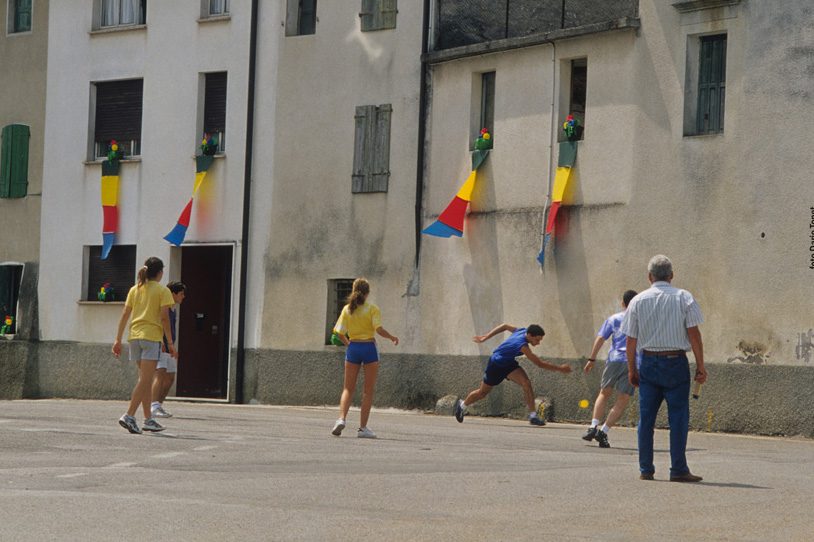
The spherical game of Tò Vegna of Farra di Mel, a town in the province of Belluno with 400 inhabitants, is passed on to new generations thanks to the strong bond with traditions felt by the inhabitants of the town. Players of all ages continue to play this game with joy and light-heartedness outdoors, in the streets of the town, testifying to the social and historical importance that this practice has for the community.
“Our participation in Tocatì has opened new horizons for us, introduced us to other communities and made us feel less alone and more aware of the social and historical importance of the game”.
CRAL Farrese
Farra di Mel, Belluno, Veneto.
Go to the website
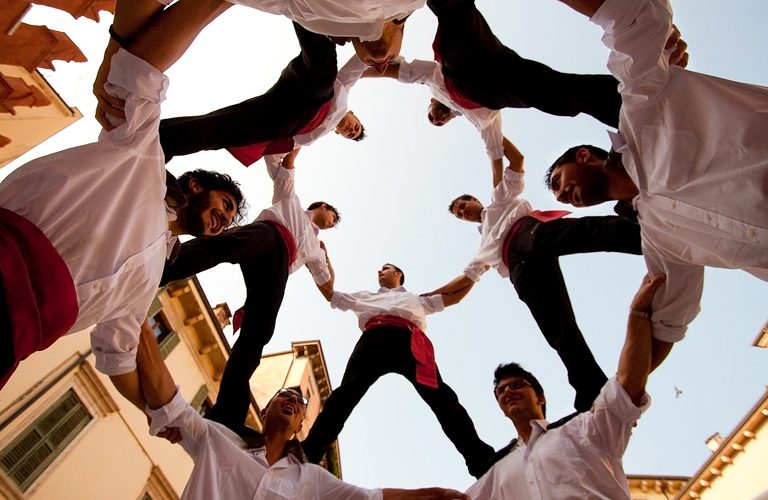
The Torri Umane Association has been working for years to recover and safeguard the practice of the Human Towers, concretely committing itself to the transmission of this ritual. Initially religious, the practice later takes on a political connotation and establishes itself as a symbol of social balance between social classes. The association has participated in Tocatì Festival for many years and, thanks to the activities promoted by AGA, has met several traditional play communities at a national and international level, encouraging the exchange and comparison between ludic practices.
“The Association’s participation in the various Tocatì initiatives has allowed us to make contact with a broader level on a national and international scale, reinforcing the belief that our game and our traditions represent something precious and indispensable. Our commitment is in the direction of ever greater coordination with the experiences of other communities, in line with the vocation and growing commitment of the Tocatì program. Knowing and participating in other people’s traditions allows us to feel part of something more complex, an increasingly broader and more powerful movement to safeguard our common heritage.”
Associazione Torri Umane
Irsina, Potenza, Basilicata.
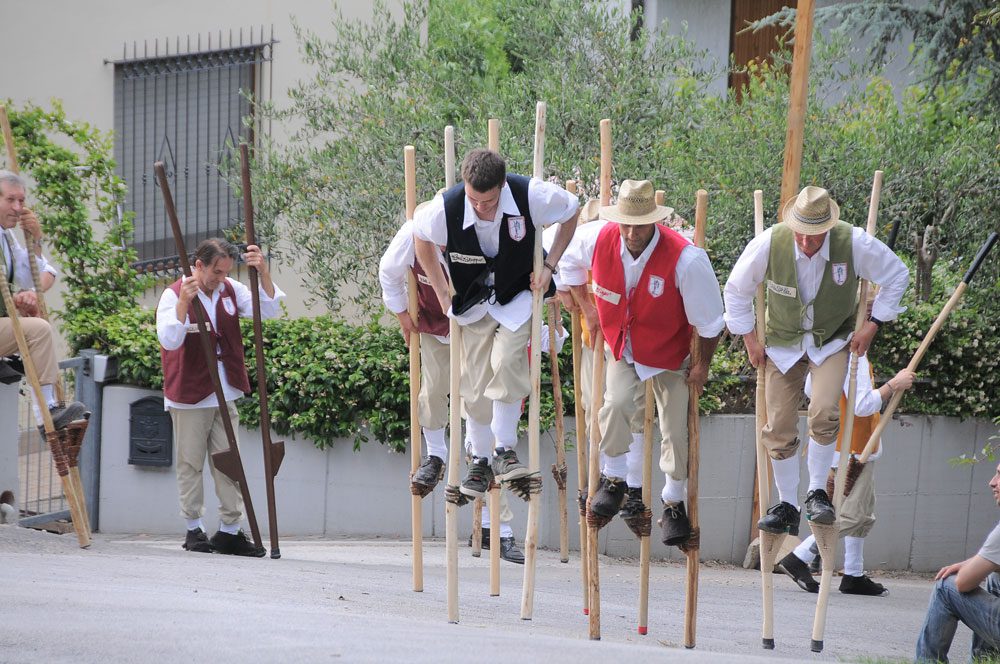
The Trampolists of Schieti pass on the traditional custom of walking on stilts: once used to cross marshy areas, they are now the protagonists of the Palio dei Trampoli, a heartfelt and participatory event that takes place every year in Urbino. The Trampolists of Schieti have been collaborating on the activities proposed by AGA to raise awareness and promote this game since 2007. Once a means of transport for farmers and miners, stilts were used to wade across the river and reach their workplace, while in more recent times they have been revived to compete in outdoor summer competitions in the medieval village of Schieti. This recreational practice was at the Tocatì festival in 2007, 2011, 2012, 2017 and 2021. In 2008 and 2015, AGA instead reached the Marche region to raise awareness in the community on the importance of traditions linked to the game.
“For our community, the game is a moment of socialization and belonging to its own territory. For us, UNESCO is the opportunity to raise awareness of this ancient and magnificent tradition, deeply felt by the inhabitants of our ludic community. It is a source of pride.”
Don Italo Mancini Socio-cultural Center
Schieti, Urbino, Marche.
Go to the website
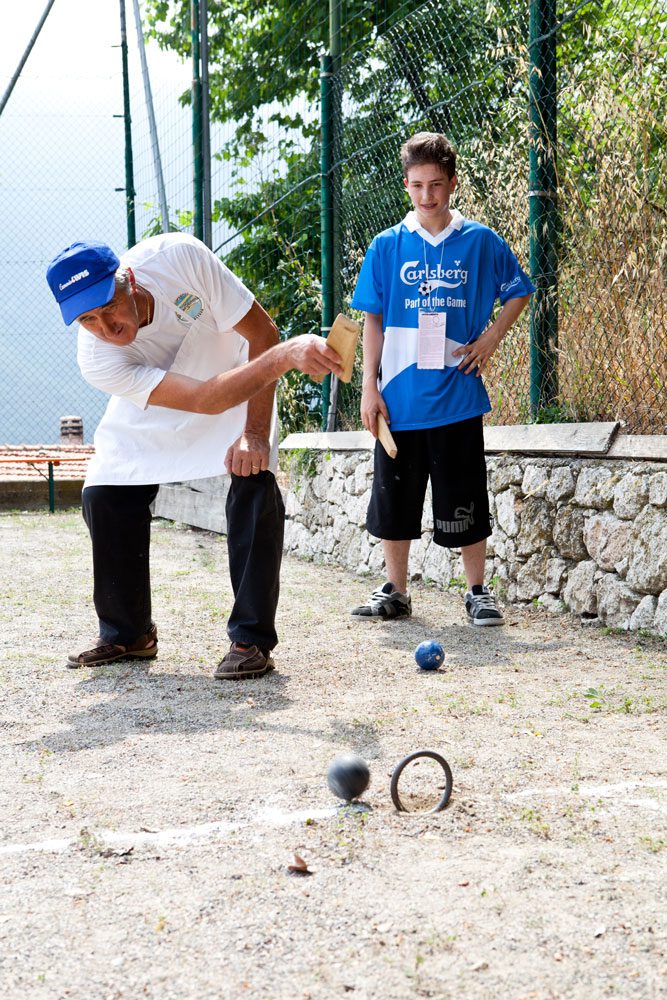
The game of Trucco da Terra, once played daily throughout the Ligurian territory, is now played mainly in Rialto, a rural and wooded village located in the hinterland of the province of Savona, in precious moments of meeting and sharing between players of different generations. Made up of a wooden paddle, coloured bowls and iron hoops stuck in the ground, Trucco is played with a few simple rules, especially in the summer.
“Our community fully shares the intentions of the Tocatì program which was for us the opportunity to search for the historical origins of our game and gave us the opportunity to make it known, thus keeping the tradition alive. The added value of participating in the Tocatì festival was the meeting and the opportunity for exchange with other Italian and international communities.”
A.S.D. Polisportiva Rialtese
Rialto, Savona, Liguria.
Go to the website
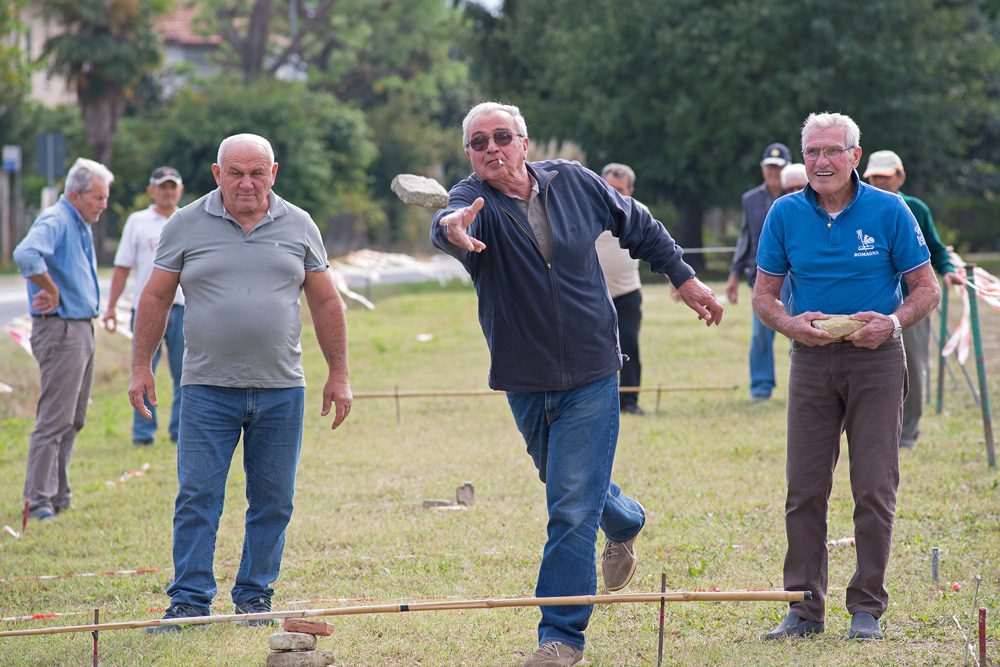
The Festivals and Fairs Committee of Faenza has been participating in the Tocatì program and festival for many years with the Romagna game of Zachegn, similar to bowls, but whose playing tools are made of stone tiles. During the year the game is proposed in schools, at popular festivals, in parishes and in cultural clubs in the area. Its strength is its simplicity, which allows it to transmit a popular pastime with distant origins that today involves players of all cultures and ages.
“The Tocatì program is for us a moment in which to discuss with other ludic communities the strategies and methods that allow us to continue working on the diffusion of Traditional Games and Sports. We recognize UNESCO as the world institution that can continue to promote peace and coexistence between different peoples through education, culture, communication and information. Promoting respect and defending freedoms is also fundamental through the protection of moments of true communion such as games and sports.”
Committee of Festivals and Fairs of Faenza
Faenza, Ravenna, Emilia Romagna.
Go to the website